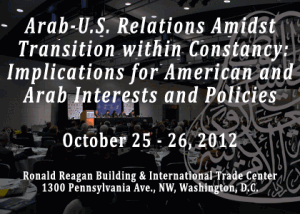October 25-26, 2012
Before the National Council on U.S.-Arab Relations launched its first Annual Arab-U.S. Policymakers conference in 1991, we asked numerous American policymakers a single question:
“What bedevils you the most in your tasks to recommend effective policies?”
The answers differed only slightly from one person to the next. A common theme running through all the responses was, and I paraphrase, the following. The “W” questions are ones that policymakers deal with all the time. In and of themselves, they are difficult enough. They include the following:
“What” needs to be done;
“When” does it need to be done;
“Why” does it need to be done;
“Where” will we likely be if we do this or if we do not;
“Who” needs to do what; and, sometimes even,
“Whether” something needs to be done.
But the most difficult questions of all, the ones policymakers inform us they find most vexing, are “How” questions, for these, unlike most of the others, cannot be answered with a yes or no. Rather, the answer to each comes with a cost.
Background, Context, and Perspective
- Sometimes the cost is political, as when leaders of an administration’s political party or a government’s most important advisers or constituents are certain to put their foot down and say no.
- Sometimes the cost is financial, as when it is pointed out that there are no funds allocated, authorized, or appropriated for that which is recommended.
- Sometimes, as for examples in rejecting the requests of senior armed forces officers in the field for the mobilization and deployment of more troops, the cost lies in having to admit that the requisite competent human resources to implement a policy recommendation simply do not exist.
- Sometimes, as for example in countering Improvise Explosive Devices used against U.S. and Allied forces in Afghanistan and Iraq, the cost is one of technology, equipment, and/or structures or systems that do not exist or, if they do, would have to be transferred from where they are to where they are needed more at what, arguably, would be a prohibitively high cost in terms of time, effort, and money.
- Sometimes the cost is in credibility, as when an administration or government is on record as being strongly opposed to exactly what someone has just recommended as a solution or a palliative.
- Sometimes, as for example in the case of Immediate Past President George W. Bush’s decision to invade Iraq, a country that had not attacked the United States, the cost is moral in the sense that it clearly violates the Golden Rule of Do not do to others what you would not have others do to you.
- Sometimes, as for example in the aftermath of one of the recent presidential debates between President Barack Obama and his Challenger, former Massachusetts Governor Mitt Romney, the cost could be a sharp downturn in the public approval rating of a president, premier, or head of state.
- Sometimes the cost might be a definite setback to the country’s image and the degree of trust and confidence it seeks to cultivate and maintain among its allies.
A Public Service as Well as Food for Thought
With this as background, context, and perspective, there follows a series of questions relating to contemporary Arab-U.S. relations with which policymakers on one side or another, and sometimes both sides, grapple daily. They are provided in the spirit of a public service not only to the policymakers entrusted to improve Arab-U.S. relations and not make them worse. They are also offered as food for thought for intellectuals, scholars, teachers, students, analysts, investment strategists, and specialists in public policy research institutes in addition to many others eager to enhance their knowledge and understanding of the state of play in Arab-U.S. relations.

John Duke Anthony
Founding President and CEO
National Council on U.S.-Arab Relations
Eight Categories of “ HOW” Questions
DEFENSE COOPERATION DYNAMICS: Enhancing Regional Security.
ENERGY:Policymaking Dynamics of Sources, Supply, and Security.
POLICYMAKING CONSIDERATIONS REGARDING REIONAL GEOPOLICAL DYNAMICS: Iraq and Syria.
POLICYMAKING CONCERNS RELATED TO REGIONAL GEOPOLITICAL DYNAMICS: Arab North Africa.
POLICYMAKING CHALLENGES PERTAINING TO REGIONAL GEOPOLITICAL DYNAMICS:The Palestinian Future.
POLICYMAKING OPPORTUNITIES AND LESSONS LEARNED FROM REGIONAL GEO-POLITICAL DYNAMICS: The Arabian Peninsula (GCC Countries and Yemen).
POLICYMAKING OPPORTUNITIES REGARDING BUSSINESS, FINANCE AND HUMAN RESOURCE DEVELOPMENT.
AMERICAN AND ARAB POLICY SUCCESSES AND SHORTCOMINGS REGARDING THE REGIONAL GEOPOLITICAL DYNAMICS OF IRAN.
Continue reading »



You must be logged in to post a comment.